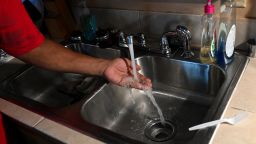The Environmental Protection Agency has determined water from both treatment plants in Jackson, Mississippi, is safe to drink, an agency spokesperson said in a statement.
The announcement comes just over two months after Jackson’s residents were launched into a public water crisis as flooding overwhelmed the city’s already troubled water system and the main treatment plant failed, resulting in brown, cloudy water flowing from pipes, a catastrophic water shortage and weeks of boil water notices.
Mayor Chokwe Antar Lumumba said Monday that the EPA determined the city is now in compliance with the Safe Water Drinking Act, which regulates public drinking water standards. He said the update was “welcome news.”
“Current sampling confirms water delivered from J.H. Fewell Water and O.B. Curtis Water Treatment is safe to drink. In addition, sampling for lead and copper has been completed and results are expected in mid-November,” the EPA statement said.
Due to cloudy water at the O.B. Curtis plant in late July, the city was under a boil water notice before the plant’s failure in August, leaving residents without safe water to brush their teeth, cook, drink or wash dishes. Boil water notices have become a fact of life for Jackson residents as the city’s water system has been plagued by years of old and leaky pipes, malfunctioning plants and insufficient funds for repairs.
Lumumba said the city is actively working to secure a firm to handle the operations and maintenance at the O.B. Curtis Water Plant, which failed in late August after decades of deferred maintenance.
“In the meantime, we are working closely with the Department of Justice and the EPA to ensure our treatment facility continues to function,” Lumumba said.
The city remains under a state of emergency, however, as Mississippi Gov. Tate Reeves recently extended the order until November 22. In a statement, Reeves explained the extension will allow management of the O.B. Curtis plant to transition from the state to the private operator chosen by the city.
“The people of Jackson, Mississippi, deserve access to clean and safe water, and EPA is committed to working with state and local authorities to make that a reality – in the near and long-terms,” the EPA statement said.
The statement added, “Given that localized issues may occur in the future, we encourage residents to stay vigilant about updates and follow all instructions related to boil water advisories. EPA will continue to ensure residents remain informed about ongoing efforts to improve the drinking water system.”
The EPA said in mid-September that it would investigate the city’s water crisis. In response to complaints filed by the NAACP and Jackson residents, the agency has also opened a federal civil rights investigation into whether the Mississippi Department of Health and the Mississippi Department of Environmental Quality “discriminated against the majority Black population of the City of Jackson on the basis of race in the funding of water infrastructure and treatment programs and activities,” the EPA said in a mid-October announcement.
The city of roughly 150,000 residents is 83% Black.
Neither the agencies nor the office of the governor responded to CNN’s previous request for comment following the mid-October announcement.
CNN’s Amir Vera, Claire Colbert, Hannah Sarisohn, Theresa Waldrop, Jason Hanna and Jamiel Lynch contributed to this report.





